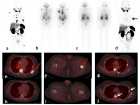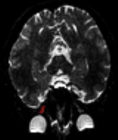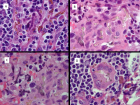Abstract
Case Report
Near Complete Response to 177Lu-PSMA-DKFZ-617 Therapy in a Patient with Metastatic Castration Resistant Prostate Cancer
Madhav Prasad Yadav, Sanjana Ballal a and Chandrasekhar Bal*
Published: 05 November, 2017 | Volume 1 - Issue 3 | Pages: 083-086
Prostate specific membrane antigen, a type II transmembrane protein is an excellent target for the radionuclide therapy in advanced prostate cancer patients due to its high expression in the prostate cancer cells. We present the case of a 69-year old man with advanced metastatic castration resistant prostate cancer. In view of rising serum PSA levels despite hormonal and chemotherapy, we decided to perform a 68Ga-PSMA-HBED-CC PET/CT scan (prostate specific membrane antigen). It revealed intense radiotracer uptake in the prostate, lymph nodes and multiple skeletal sites. Five cycles of 177Lu-PSMA-DKFZ-617 radioligand therapy were administered in the patient followed by an intrim 68Ga-PSMA-HBED-CC PET/CT. Intrim 68Ga-PSMA-HBED-CC PET/CT scan demonstrated a near complete remission of disease with a corresponding decrease in the sPSA levels. During the follow-up duration of 12 months, the patient did not develop haematological, kidney and liver toxicity during the course of treatment and follow-up. 177Lu-PSMA-DKFZ-617 is a promising therapeutic option in metastatic castration resistant prostate cancer (mCRPC) patients.
Read Full Article HTML DOI: 10.29328/journal.jro.1001012 Cite this Article Read Full Article PDF
Keywords:
Metastatic castration resistant prostate cancer; 68Ga- PSMA-HBED-CC PET/CT; 177Lu-PSMA-DKFZ-617 Radioligand therapy
References
- Hotte SJ, Saad F. Current management of castrate-resistant prostate cancer. Curr Oncol. 2010; 17: 72-79. Ref.: https://goo.gl/fnZuRe
- Kirby M, Hirst C, Crawford ED. Characterising the castration-resistant prostate cancer population: a systemic review. Int J Clin Pract. 2011; 65: 1180-1192. Ref.: https://goo.gl/UJ2PXY
- Green S, Weiss GR. Southwest Onology group standard response criteria, endpoint definitions and toxicity criteria. Invest new Drugs. 1992; 10: 239-253. Ref.: https://goo.gl/EfnvAK
- Afshar-Oromieh A, Malcher A, Eder M, Eisenhut M, Linhart HG, et al. PET imaging with a [68Ga]gallium-labelled PSMA ligand for the diagnosis of PCa: biodistribution in humans and first evaluation of tumour lesions. Eur J Nucl Med Mol Imaging. 2013; 40: 486-495. Ref.: https://goo.gl/ZNDQFU
- Minner S, Wittmer C, Graefen M, Salomon G, Steuber T, et al. High level PSMA expression is associated with early PSA recurrence in surgically treated prostate cancer. Prostate. 2011; 71: 281-288. Ref.: https://goo.gl/4m3X6d
- Rybalov M, Ananias HJ, Hoving HD, van der Poel HG, Rosati S, et al. PSMA, EpCAM, VEGF and GRPR as imaging targets in locally recurrent prostate cancer after radiotherapy. Int J Mol Sci. 2014; 15: 6046-6061. Ref.: https://goo.gl/QNrNbm
- Baum RP, Kulkarni HR, Schuchardt C, Singh A, Wirtz M, et al. 177Lu-Labeled Prostate-Specific Membrane Antigen Radioligand Therapy of Metastatic Castration-Resistant Prostate Cancer: Safety and Efficacy. J Nucl Med. 2016; 57: 1006-1013. Ref.: https://goo.gl/vBz8DZ
- Afshar-Oromieh A, Holland-Letz T, Giesel FL, Kratochwil C, Mier W, et al. Diagnostic performance of (68)Ga-PSMA-11 (HBED-CC) PET/CT in patients with recurrent prostate cancer: evaluation in 1007 patients. Eur J Nucl Med Mol Imaging. 2017; 44: 1258-1268. Ref.: https://goo.gl/HmbeA6
- Afshar-Oromieh A, Hetzheim H, Kratochwil C, Benesova M, Eder M, et al. The Theranostic PSMA Ligand PSMA-617 in the Diagnosis of Prostate Cancer by PET/CT: Biodistribution in Humans, Radiation Dosimetry, and First Evaluation of Tumor Lesions. J Nucl Med. 2015; 56: 1697-1705. Ref.: https://goo.gl/mwdodQ
- Kratochwil C, Giesel FL, Stefanova M, Benešová M, Bronzel M, et al. PSMA-Targeted Radionuclide Therapy of Metastatic Castration-Resistant Prostate Cancer with 177Lu-Labeled PSMA-617. J Nucl Med. 2016; 57: 1170-1176. Ref.: https://goo.gl/Ehvsmj
- Rahbar K, Ahmadzadehfar H, Kratochwil C, Haberkorn U, Schäfers M, et al. German Multicenter Study Investigating 177Lu-PSMA-617 Radioligand Therapy in Advanced Prostate Cancer Patients. J Nucl Med. 2017; 58: 85-90. Ref.: https://goo.gl/zptRHE
- Yadav MP, Ballal S, Tripathi M, Damle NA, Sahoo RK, et al. (177)Lu-DKFZ-PSMA-617 therapy in metastatic castration resistant prostate cancer: safety, efficacy, and quality of life assessment. Eur J Nucl Med Mol Imaging. 2017; 44: 81-91. Ref.: https://goo.gl/z3GMyq
- Rahbar K, Boegemann M, Yordanova A, Eveslage M, Schäfers M, et al. PSMA targeted radioligandtherapy in metastatic castration resistant prostate cancer after chemotherapy, abiraterone and/or enzalutamide. A retrospective analysis of overall survival. Eur J Nucl Med Mol Imaging. 2017; 45: 12-19. Ref.: https://goo.gl/gKxd59
- Kabasakal L, Toklu T, Yeyin N, Demirci E, Abuqbeitah M, et al. Lu-177-PSMA-617 Prostate-Specific Membrane Antigen Inhibitor Therapy in Patients with Castration-Resistant Prostate Cancer: Stability, Bio-distribution and Dosimetry. Mol Imaging Radionucl Ther. 2017; 26: 62-68. Ref.: https://goo.gl/vyDNeE
- Delker A, Fendler WP, Kratochwil C, Brunegraf A, Gosewisch A, et al. Dosimetry for (177)Lu-DKFZ-PSMA-617: a new radiopharmaceutical for the treatment of metastatic prostate cancer. Eur J Nucl Med Mol Imaging. 2016; 43: 42-51. Ref.: https://goo.gl/Kdwi38
- Yadav MP, Ballal S, Tripathi M, Damle NA, Sahoo RK, et al. Post-therapeutic dosimetry of 177Lu-DKFZ-PSMA-617 in the treatment of patients with metastatic castration-resistant prostate cancer. Nucl Med Commun. 2017; 38: 91-98. Ref.: https://goo.gl/DbHCt6
Figures:

Figure 1
Similar Articles
-
Near Complete Response to 177Lu-PSMA-DKFZ-617 Therapy in a Patient with Metastatic Castration Resistant Prostate CancerMadhav Prasad Yadav,Sanjana Ballal a,Chandrasekhar Bal*. Near Complete Response to 177Lu-PSMA-DKFZ-617 Therapy in a Patient with Metastatic Castration Resistant Prostate Cancer. . 2017 doi: 10.29328/journal.jro.1001012; 1: 083-086
Recently Viewed
-
Pneumothorax as Complication of CT Guided Lung Biopsy: Frequency, Severity and Assessment of Risk FactorsGaurav Raj*,Neha Kumari,Neha Singh,Kaustubh Gupta,Anurag Gupta,Pradyuman Singh,Hemant Gupta. Pneumothorax as Complication of CT Guided Lung Biopsy: Frequency, Severity and Assessment of Risk Factors. J Radiol Oncol. 2025: doi: 10.29328/journal.jro.1001075; 9: 012-016
-
The Police Power of the National Health Surveillance Agency – ANVISADimas Augusto da Silva*,Rafaela Marinho da Silva. The Police Power of the National Health Surveillance Agency – ANVISA. Arch Cancer Sci Ther. 2024: doi: 10.29328/journal.acst.1001046; 8: 063-076
-
A Comparative Study of Serum Sodium and Potassium Levels across the Three Trimesters of PregnancyOtoikhila OC and Seriki SA*. A Comparative Study of Serum Sodium and Potassium Levels across the Three Trimesters of Pregnancy. Clin J Obstet Gynecol. 2023: doi: 10.29328/journal.cjog.1001137; 6: 108-116
-
Chaos to Cosmos: Quantum Whispers and the Cosmic GenesisOwais Farooq*,Romana Zahoor*. Chaos to Cosmos: Quantum Whispers and the Cosmic Genesis. Int J Phys Res Appl. 2025: doi: 10.29328/journal.ijpra.1001107; 8: 017-023
-
Phytochemical Compounds and the Antifungal Activity of Centaurium pulchellum Ethanol Extracts in IraqNoor Jawad Khadhum, Neepal Imtair Al-Garaawi*, Antethar Jabbar Al-Edani. Phytochemical Compounds and the Antifungal Activity of Centaurium pulchellum Ethanol Extracts in Iraq. J Plant Sci Phytopathol. 2024: doi: 10.29328/journal.jpsp.1001137; 8: 079-083
Most Viewed
-
Evaluation of Biostimulants Based on Recovered Protein Hydrolysates from Animal By-products as Plant Growth EnhancersH Pérez-Aguilar*, M Lacruz-Asaro, F Arán-Ais. Evaluation of Biostimulants Based on Recovered Protein Hydrolysates from Animal By-products as Plant Growth Enhancers. J Plant Sci Phytopathol. 2023 doi: 10.29328/journal.jpsp.1001104; 7: 042-047
-
Sinonasal Myxoma Extending into the Orbit in a 4-Year Old: A Case PresentationJulian A Purrinos*, Ramzi Younis. Sinonasal Myxoma Extending into the Orbit in a 4-Year Old: A Case Presentation. Arch Case Rep. 2024 doi: 10.29328/journal.acr.1001099; 8: 075-077
-
Feasibility study of magnetic sensing for detecting single-neuron action potentialsDenis Tonini,Kai Wu,Renata Saha,Jian-Ping Wang*. Feasibility study of magnetic sensing for detecting single-neuron action potentials. Ann Biomed Sci Eng. 2022 doi: 10.29328/journal.abse.1001018; 6: 019-029
-
Pediatric Dysgerminoma: Unveiling a Rare Ovarian TumorFaten Limaiem*, Khalil Saffar, Ahmed Halouani. Pediatric Dysgerminoma: Unveiling a Rare Ovarian Tumor. Arch Case Rep. 2024 doi: 10.29328/journal.acr.1001087; 8: 010-013
-
Physical activity can change the physiological and psychological circumstances during COVID-19 pandemic: A narrative reviewKhashayar Maroufi*. Physical activity can change the physiological and psychological circumstances during COVID-19 pandemic: A narrative review. J Sports Med Ther. 2021 doi: 10.29328/journal.jsmt.1001051; 6: 001-007

HSPI: We're glad you're here. Please click "create a new Query" if you are a new visitor to our website and need further information from us.
If you are already a member of our network and need to keep track of any developments regarding a question you have already submitted, click "take me to my Query."




















































































































































